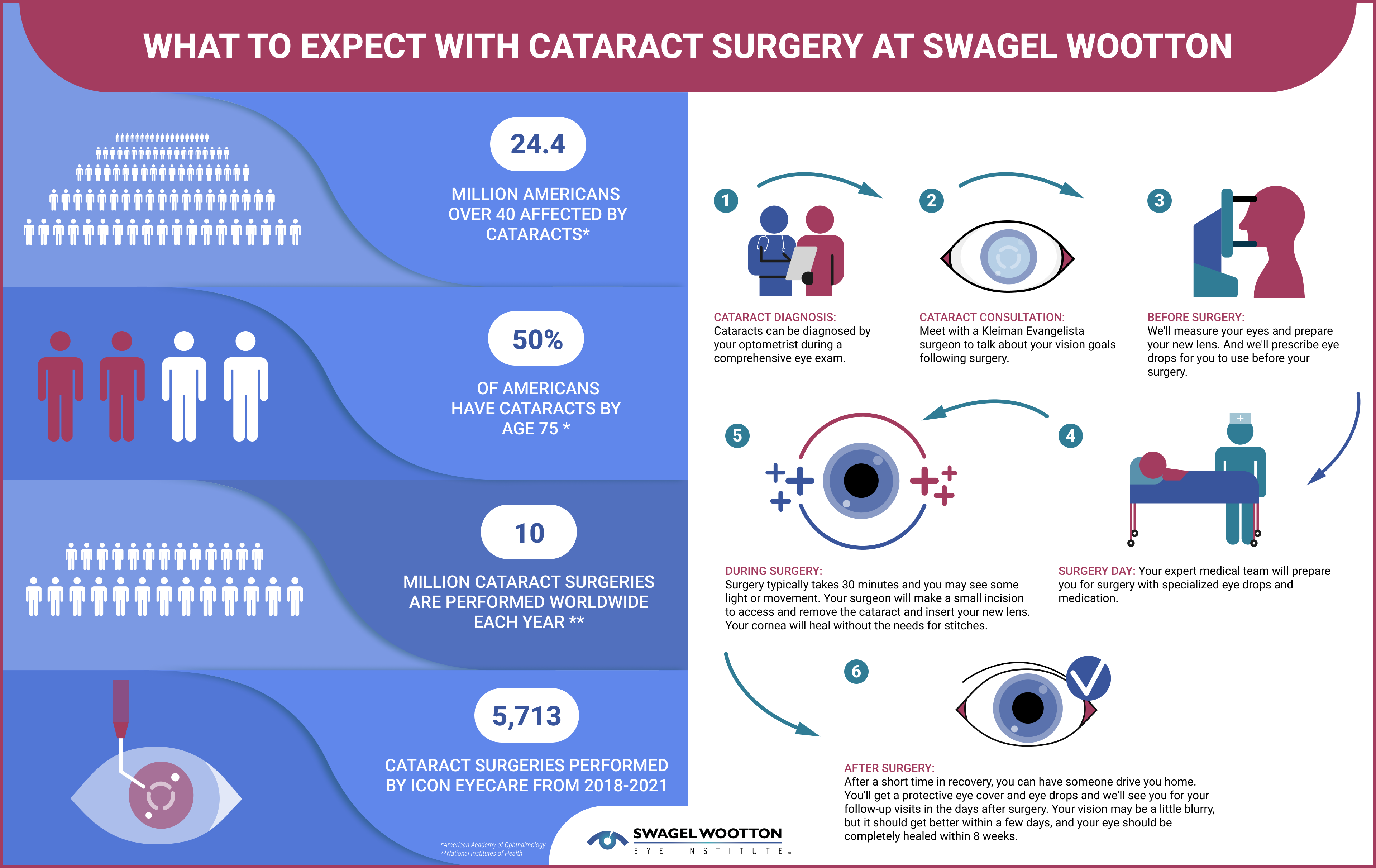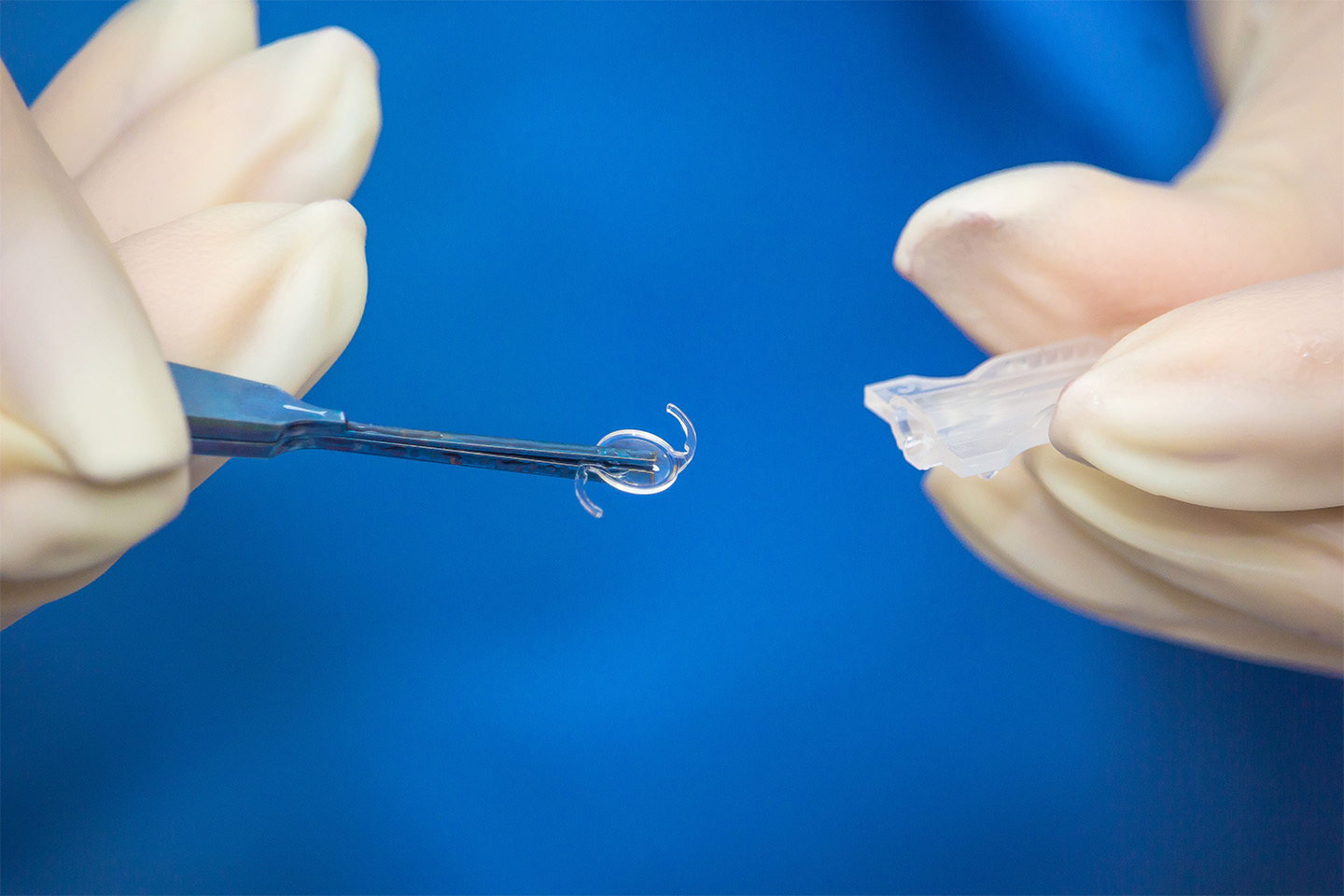What to Expect with Cataract Surgery: Before, During and After

If you or a loved one is suffering from cataracts or progressive blurred vision, it is important to visit an eye doctor. At Swagel Wootton Eye Institute, our qualified and experienced team of eye doctors and surgeons will evaluate your eyes and determine the best course of treatment for you. If necessary, our eye surgeons will perform cataract surgery. After the surgery, you can enjoy clear vision and get back to enjoying life in the greater Phoenix area.
For many, especially aging individuals, it is helpful to know what to expect when you come to our eye care center. Follow along with this short guide, and contact us to learn more.
What Is a Cataract?
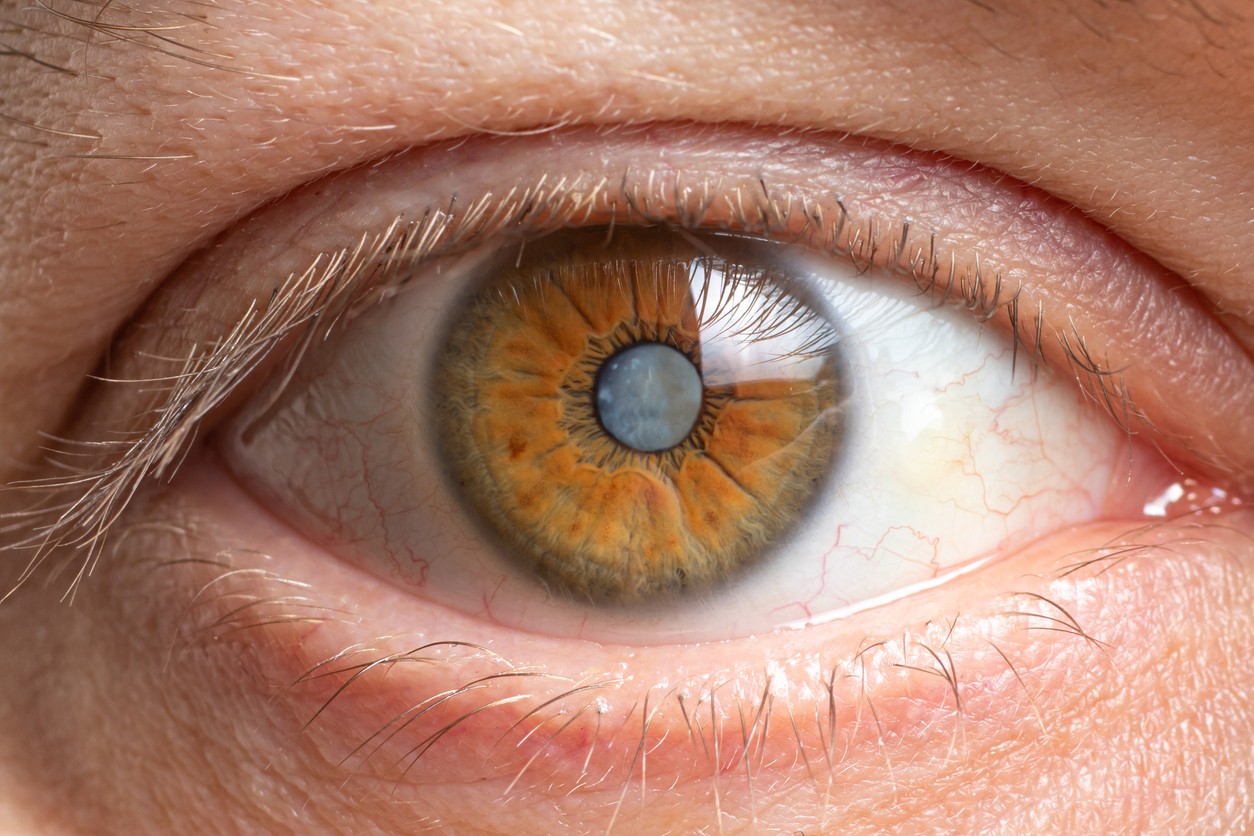
Have you noticed your vision becoming cloudy, blurry, or dim? Do you have a harder time seeing at dusk, dawn, or nighttime? Do you need more light to perform daily activities, such as reading the newspaper or watching television? These are all subtle signs you may have a cataract or cataracts. You can also take our cataract self-test if it is one of your vision concerns.
A cataract is a cloudiness in the lens of your eye. Typically, your natural lens is completely clear, allowing light to pass through your eye correctly. When your eye can correctly interpret light, you can clearly see images, colors, and text. When you have cataracts, however, a clouded lens blocks the natural passage of light. As a result, you may see blurred images, faded colors, and distorted text.
Cataracts can start to form at age 35, although most patients may not notice vision problems until much later in life. They are progressive, meaning they will get worse over time. For this reason, if you notice vision changes, it is imperative to get a professional eye evaluation. Remember, your eye health and your quality of life depend on proper assessment and treatment.
Scheduling a Consultation
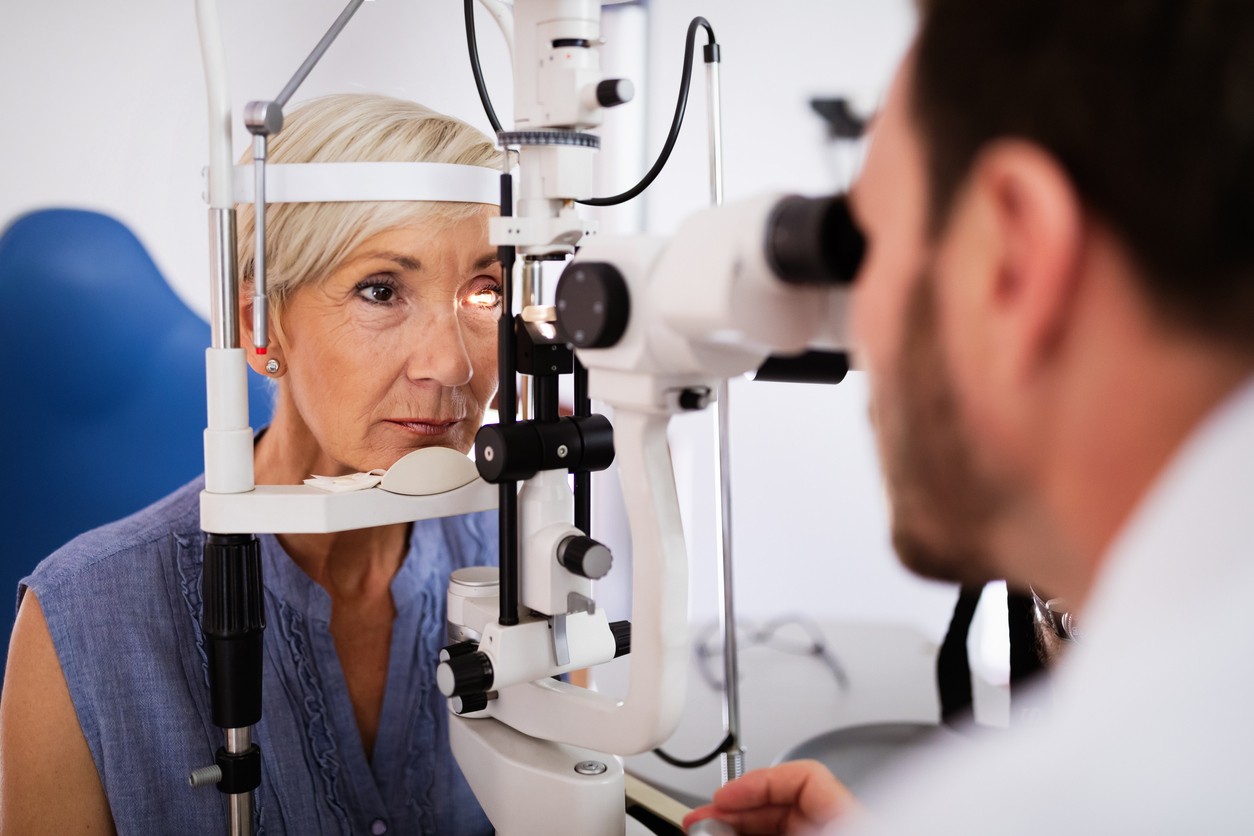
When you are ready to discuss your cataracts with an eye doctor, we can schedule a consultation for you. When you come in, a professional optometrist or ophthalmologist will evaluate your eyes, diagnose your cataracts, and determine if you are eligible for cataract surgery.
We will perform a thorough assessment of your eyes or your affected eye to diagnose cataracts. It will include reviewing your detailed health and medication history, your vision history, and performing eye tests. Your eye doctor may perform additional tests if they suspect another eye issue, such as astigmatism, presbyopia, glaucoma, or macular degeneration.
Types of Cataract Surgery
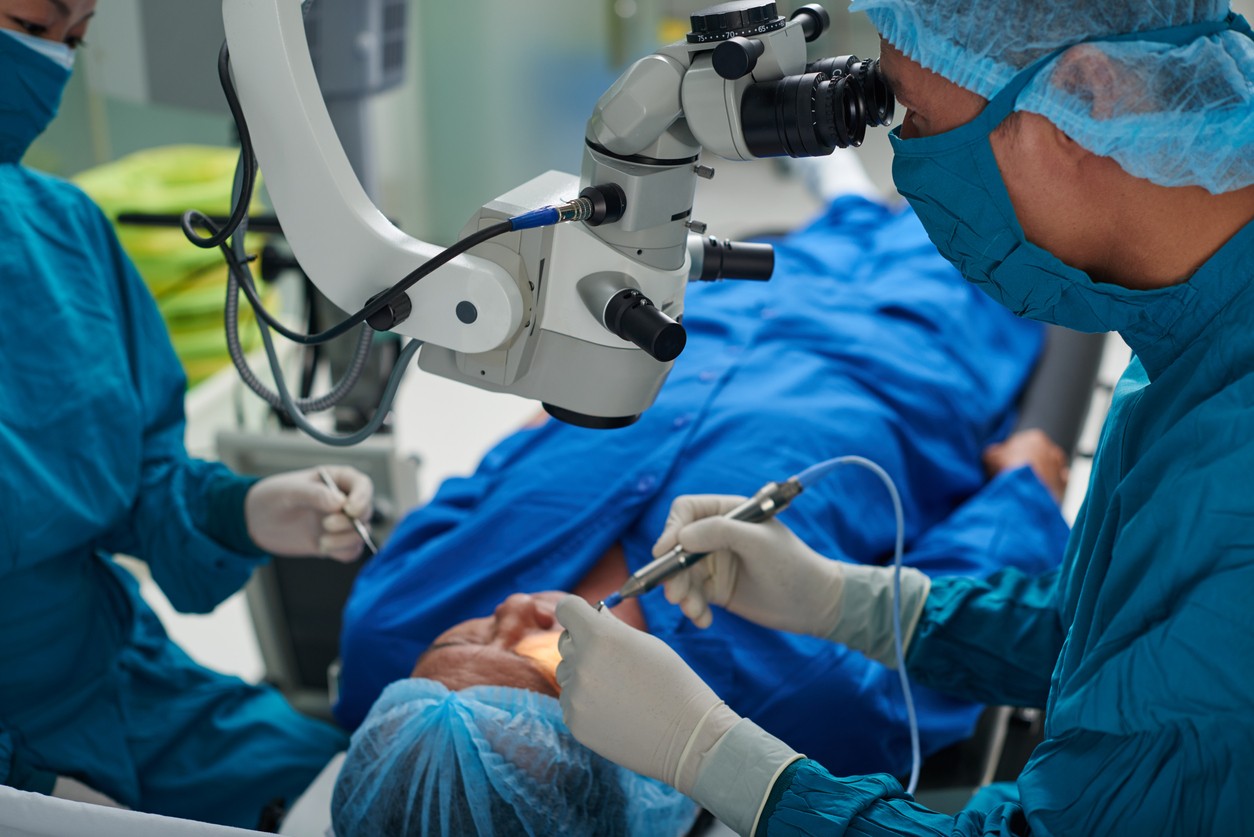
At Swagel Wootton Eye Institute, we are proud to offer state-of-the-art cataract surgery. Cataract surgery is a procedure in which an eye surgeon removes the clouded lens and replaces it with a clear, artificial one. Our eye doctors perform two types of cataract surgery: traditional cataract surgery and laser cataract surgery.
Traditional cataract surgery, or phacoemulsification, is a common type of cataract surgery covered by most health insurance companies. The eye surgeon will create a tiny incision on the side of your eye to reach your lens. Then, an ultrasonic device uses ultrasound waves to break up the cloudy lens. After, the surgeon suctions the pieces from the eye and inserts an intraocular lens (IOL). An IOL is an artificial lens acting like a healthy, natural lens.
Laser cataract surgery is similar to traditional cataract surgery, except the eye surgeon will use a special laser to perform the procedure. First, the surgeon will use a camera to scan and read your eye’s surface. Then, they will use a LenSx Cataract Laser to create a thin incision and break up the clouded lens. Once the cataract is removed, the doctor will insert your new IOL, using an intraoperative aberrometry tool to customize your lens.
Choosing an Artificial Lens
At your initial appointment, your eye doctor will discuss your evaluation results and your vision goals. Together, you will determine which type of surgery is best for you and what kind of IOLs match your lifestyle. These intraocular lenses will replace your eyes’ natural lenses, providing clearer vision, restoring focus, offering rich and vivid colors, and decreasing your need for eyeglasses or contacts.
At Swagel Wootton Eye Institute, we offer four main types of premium IOLs: monofocal IOLs, toric IOLs and multifocal IOLS. Learn more about each type below and select an option that best meets your vision goals.
Types of Lenses
Our first, and most popular, type of lens is the monofocal lens. With the monofocal lens, you can choose a specific distance: close, mid-range, or far distances. Most people opt for long-distance range and use eyeglasses or contact lenses to see and focus closely.
A toric lens is a perfect option if you suffer from cataracts and astigmatism. It can correct an irregular corneal eye shape, helping your eye direct light properly. Similar to monofocal lenses, they also allow for single-distance vision.
Our advanced trifocal lenses, AcrySof® IQ PanOptix® Trifocal Lens, offer patients a full range of excellent vision at three distances (close, mid-range, and far) with exceptional detail.
In addition, we offer a Light Adjustable Lens made of a photo-sensitive material that changes the power of your implanted lens in response to UV light.
Before Surgery
If you and your doctor agree cataract surgery is the best course of action for your condition, we will schedule you for a pre-operative appointment. During this appointment, our Swagel Wootton eye care team will:
- Discuss your current health, eye health, and current medications and supplements. Please let us know if anything changes between your consultation and your pre-operative appointment.
- Take you through the surgery process step-by-step to understand what to expect as a cataract patient.
- Inform you of any surgery risks.
- Guide post-surgery care.
- Determine which new lens is perfect for you.
- Detail ideal post-surgery vision results.
- Schedule your surgery date and prescribe antibiotic and steroid eye drops for your recovery. If you have a cataract in your other eye, you may receive two separate appointments for your second surgery after your first eye heals.
During Surgery
Our eye care professionals understand that surgery can be a scary thought. We want all our patients to feel very comfortable with the treatment before beginning the procedure. On the day of your surgery, we will make sure you understand the surgery and go over post-operative care.
Our eye surgeons are experts in refractive surgery, and cataract surgery is no exception. We will carefully perform your surgery in 15-20 minutes as a quick, outpatient procedure. You can expect it to proceed as follows: Patients are usually given IV sedation before the procedure.
- The cataract doctor will place eye drops in the eye to dilate your pupil.
- The eye doctor will numb your affected eye with local anesthesia. In this way, your procedure will be painless.
- Using a sharp blade or a laser, the doctor will make a small incision in the side of your cornea.
- A phacoemulsification tool breaks up the lens affected with a cataract, or a laser softens and cuts the lens.
- A suction tool vacuums the pieces safely from the eye.
- The cataract surgeon inserts the chosen IOL.
- The doctor may use an intraoperative aberrometry machine to determine your eye’s refractive power and choose an adjustable lens that matches your needs.
- The eye surgeon will allow the incision to heal on its own. No stitches are necessary.
After Surgery
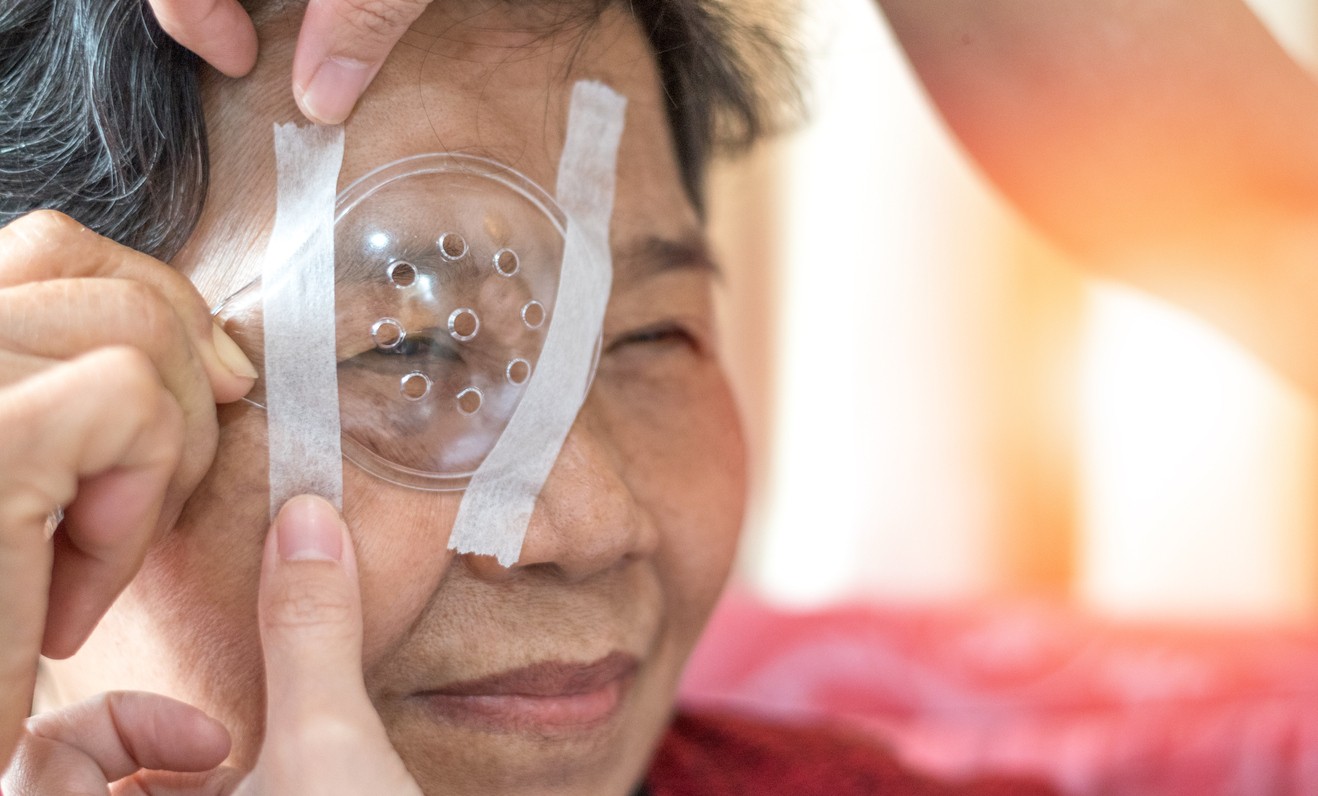
After your cataract surgery is complete, your eye doctor will place an eye patch or protective shield over your eye. It will protect your eye from bright light, debris, dust, and injury as your eye heals. Your doctor will determine how long you should wear your eye shield during the recovery period or if you only need to wear it to sleep. They will also provide you with anti-inflammatory eye drops, and they may give anti-bacterial drops to prevent infection.
You may need to stay in the waiting room for at least 30 minutes to one-hour post-op to make sure you feel good and have no reaction. You must have someone to drive you home afterward.
Typically, you will have a follow-up appointment scheduled 24-48 hours after your surgery. Your eye doctor will evaluate your eye and make sure you are healing correctly.
Complete healing takes 3-4 weeks in most cases, but you should see significant vision improvement and fewer symptoms after around a month. During your cataract surgery recovery, for up to a month, you should avoid:
- Heavy lifting
- Strenuous activity
- Bending over
- Exposure to bright light
- Exposure to dust or debris
- Rubbing your eyes
- Direct water or water pressure
- Swimming in pools, hot tubs or any other open water such as lakes/river/ocean
After clearing it with your eye doctor, you should be able to resume normal activities and get back to doing everything you love in only a month post-op.
When to Call Your Eye Doctor
A few typical symptoms may show up immediately after surgery or during the healing process. This may include blurry vision, inflammation, itchiness, dry eye, watery eyes, light sensitivity, and glare or halo effects.
However, extreme versions of these symptoms or other dangerous symptoms may arise in some circumstances. It is important to call your eye doctor right away in these cases. We will advise you on how to proceed.
Contact us if you experience:
- Dry eye which over-the-counter eye drops cannot help
- Extreme light sensitivity
- Redness accompanied by pain or light sensitivity
- Bursts of floaters or camera-like flashes of light
- Eye pain exceeding “discomfort” levels
- Redness and pus draining from the eye
- Vision loss
- Eyelid swelling
- Blurred vision after a week
- Glare or halo issues after three to four months
- Cloudy vision sometime after your surgery. This may be posterior capsule opacification (PCO) or the development of a secondary cataract. Our qualified eye surgeons can fix this issue in a quick procedure called a YAG laser capsulotomy.
Rediscover Crystal Clear Vision at Swagel Wootton Eye Institute

If you are suffering from cataracts or believe a parent or other loved one may have cataracts, our caring eye team would like to assist you. Cataract surgery is a quick, painless procedure that can restore clear vision and quality of life in less than half an hour. Contact our caring eye team today to schedule your consultation!
